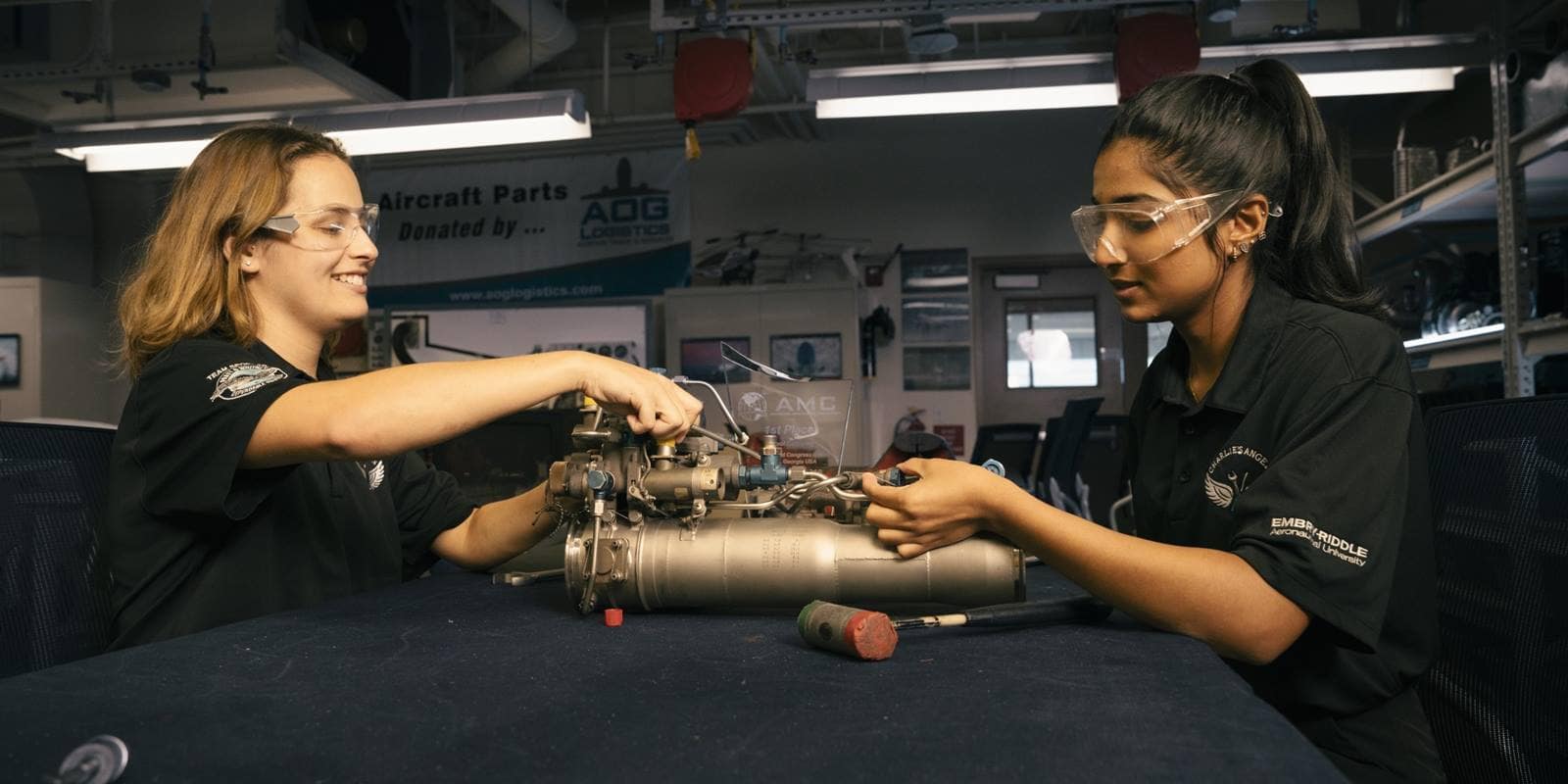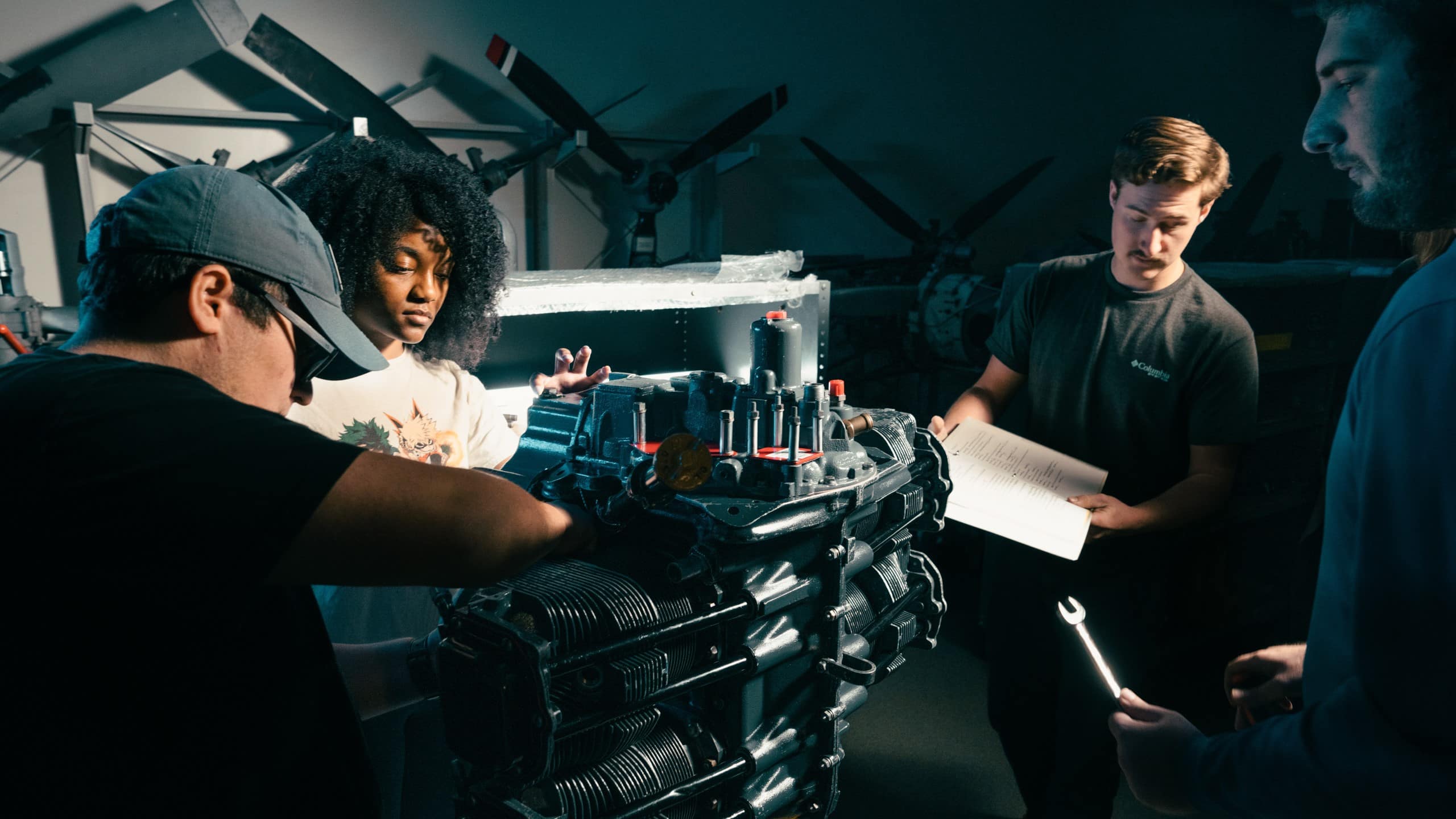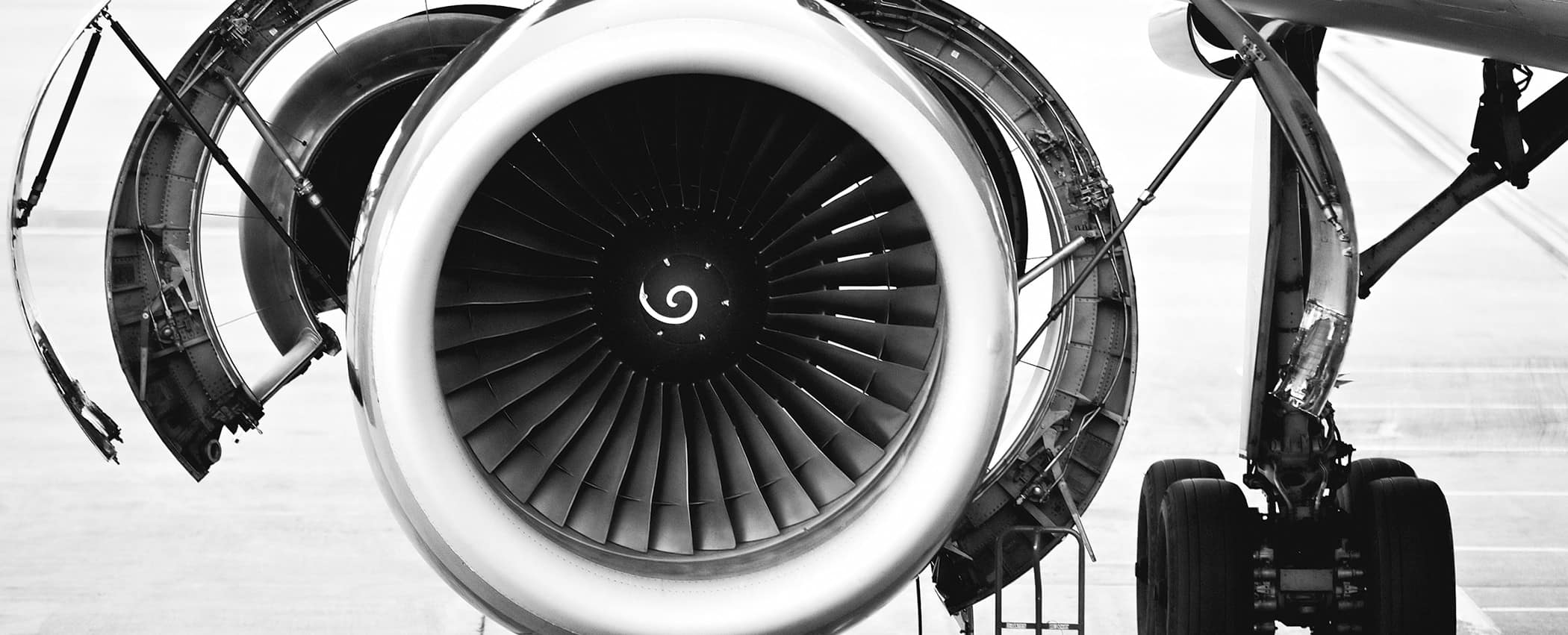
Bachelor of Science in
Aviation Maintenance Science
The B.S. in Aviation Maintenance Science is designed for students who want to increase their skills as aviation mechanics with a specific focus area.
About the Bachelor of Science in Aviation Maintenance Science
The demand for aviation maintenance specialists has never been greater, and with a degree, graduates are positioned for accelerated advancement into leadership positions. The 2023 Boeing Pilot & Technician Outlook projects a global need for 690,000 new maintenance technicians over the next 20 years. Embry-Riddle graduates emerge from the Aviation Maintenance program with the ability to inspect, service, troubleshoot and repair aircraft.
The aircraft technician program is taught by dedicated, experienced faculty who are professionals from every major industry segment. Students are surrounded by people who share the same passion for excellence, precision and safety in aviation maintenance.
Student Learning Outcomes
Learning opportunities you will have while studying to become an aviation technician:
- Describe the principles of aircraft design, performance and operating characteristics and the regulations related to aircraft maintenance
- Evaluate aviation safety and the impact of human factors on safety
- Discuss the impact on aviation operations of international aviation law, including applicable International Civil Aviation Organization (ICAO)
Aviation Maintenance Science Career Opportunities
Careers and Employers
Embry-Riddle graduates often find careers at NASA, Southwest Airlines, The Boeing Company and Northrop Grumman, with a placement rate of 92.9% within a year of graduation.
Students earning an aviation maintenance science degree often pursue careers as:
- Field or Base Maintenance Technicians
- Safety Inspectors
- Avionics Technicians
Aviation Maintenance Science Salary Information
Embry-Riddle provides the opportunity for competitive salaries, with alumni averaging $66,200 annually one-year post graduation, as of 2022.
DETAILS
About Aviation Maintenance Science at the Daytona Beach, FL Campus
Housed within the College of Aviation, the Bachelor of Science in Aviation Maintenance Science is designed for students who want to increase the value of their aviation maintenance science skills to provide wider opportunities for career advancement.
Each area of concentration is designed to complement the FAA’s Airframe and Power Plant certification, which collectively serves to bolster our students’ academic credentials. Students can obtain additional industry-recognized certifications through the minor in Avionics Line Maintenance. Through this program, students can test for the FCC General Radio Telephone Operators License (GROL) and the NCATT Aircraft Electronics Technician (AET) certificate.
Tracks/Specialties and/or Certificates
Students pursuing a Bachelor of Science in Aviation Maintenance Science must complete one of four areas of concentration:
- Flight: focuses on a maintenance background with the qualifications of a commercial pilot
- Maintenance Management: focuses on maintenance skills for advancement into a management position
- Safety Science: focuses on both industrial and aviation-specific safety courses
- Avionics Cybertechnology and Security: focuses on the importance of aerospace data connectivity and security
Professional Accreditation
The Aviation Maintenance Science program is accredited by the Aviation Accreditation Board International (AABI). Detailed information on program education goals, student learning outcomes, and student achievement data can be found here.
Aviation Maintenance Science Information
- Credits: 126
- Online or In-Person: In-Person
Helpful Links
- Tour our Daytona Beach campus
- Discover the Department's Faculty
- Explore the Fields of Study: Aviation
- Find Related Clubs & Organizations
Student Learning Outcomes
Students will:
- Evaluate aircraft performance using aviation mathematics and physics relevant to aircraft airworthiness.
- Combine skill and technical competence to solve complex aviation maintenance problems.
- Apply leadership and management principles to both teamwork and supervisory roles.
- Apply knowledge of the aviation environment by accurately returning aircraft to service within various environments.
- Demonstrate the use of special equipment and tools in the practice of aviation maintenance.
- Interpret and analyze written and/or electronic technical instructions.
- Demonstrate professional and ethical behaviors in the role as maintenance technicians and/or supervisors.
- Evaluate the efficiency and safety of technical operations and make recommendations for improvements.
- Use education and training to actively engage in life-long learning relevant to the work environment.
- Analyze trends in the aviation maintenance industry in written and spoken formats.
- Communicate trends in the aviation maintenance industry in written and spoken formats.
General Education Requirements
For a full description of Embry-Riddle General Education guidelines, please see the General Education section of this catalog. These minimum requirements are applicable to all degree programs.
| Communication Theory and Skills (COM 122, COM 219, COM 221) | 9 | |
| Lower-Level Humanities | 3 | |
| Lower-Level Social Sciences (PSY 101) | 3 | |
| Lower or Upper-Level Humanities or Social Sciences | 3 | |
| Upper-Level Humanities or Social Sciences | 3 | |
| Computer Science (CS 120) | 3 | |
| Mathematics * | 6 | |
| Physical Sciences ** | 7 | |
| Total Credits | 37 | |
- *
Mathematics required courses - MA 111 and MA 112.
- **
Physical Sciences required courses - PS 113 and PS 117 (One Laboratory required).
Aviation Maintenance Science Courses (leading to A&P certification)
| AMS 115 | Aviation Mathematics and Physics | 2 |
| AMS 116 | Fundamentals of Electricity | 4 |
| AMS 117 | Tools, Materials and Processes | 4 |
| AMS 118 | Aircraft Familiarization and Regulations | 2 |
| AMS 261 | Aircraft Metallic Structures | 3 |
| AMS 262 | Aircraft Composite Structures | 3 |
| AMS 263 | General Aviation Aircraft Systems | 3 |
| AMS 264 | General Aviation Aircraft Electrical and Instrument Systems | 3 |
| AMS 271 | Aircraft Reciprocating Powerplant and Systems | 3 |
| AMS 272 | Powerplant Electrical and Instrument Systems | 3 |
| AMS 273 | Propeller Systems | 2 |
| AMS 274 | Aircraft Turbines Powerplants and Systems | 4 |
| AMS 365 | Transport Category Aircraft Systems | 3 |
| AMS 366 | Transport Category Aircraft Electrical and Instrument Systems | 3 |
| AMS 375 | Repair Station Operations | 3 |
| AMS 376 | Powerplant Line Maintenance | 3 |
| Total Credits | 48 | |
Tuition for AMS courses is less than the other courses in the degree and is billed separately from the University block tuition. Contact Student Financial Services for additional information.
Program Specific Courses
| ACC 210 | Financial Accounting | 3 |
| AMSA 490 | Aviation Technical Operations | 3 |
| AMSA 350 | Aviation Connectivity and Cybersecurity | 3 |
| BA 201 | Principles of Management | 3 |
| CYB 235 | Computer and Network Technologies | 3 |
| SF 210 | Introduction to Aerospace Safety | 3 |
| Total Credits | 18 | |
Open Upper-Level Electives
| The Business Administration minor requires 12 Upper-Level Electives. | ||
| The Avionics Line Maintenance, Cybersecurity Application and Management, and Aviation Safety minors require 6 Upper-Level Electives. | ||
| Total Credits | 6 or 12 | |
Required Minor
| Students will select their minor of choice from the following: Avionics Line Maintenance, Aviation Safety, Business Administration, or Cybersecurity Application and Management. | ||
| Total Credits | 12 or 15 | |
| Total Degree Credits | 121 or 124 or 127 | |
Suggested Plan of Study
| Year One | ||
|---|---|---|
| Credits | ||
| COM 122 | English Composition | 3 |
| COM 219 | Speech | 3 |
| CS 120 | Introduction to Computing in Aviation | 3 |
| MA 111 | Pre-Calculus for Aviation | 3 |
| MA 112 | Applied Calculus for Aviation | 3 |
| PS 113 | Introductory Physics I (PS 113 or PS 117 must be accompanied by a 1-credit lab.) | 3 |
| PS 113L | Introductory Physics I Laboratory | 1 |
| Lower-Level Humanities Elective | 3 | |
| Lower-Level Social Science Elective | 3 | |
| Upper-Level Humanities or Social Science Elective | 3 | |
| Credits Subtotal | 28.0 | |
| Credits Total: | 28.0 | |
| Year Two | ||
|---|---|---|
| Credits | ||
| AMS 115 | Aviation Mathematics and Physics | 2 |
| AMS 116 | Fundamentals of Electricity | 4 |
| AMS 117 | Tools, Materials and Processes | 4 |
| AMS 118 | Aircraft Familiarization and Regulations | 2 |
| AMS 261 | Aircraft Metallic Structures | 3 |
| AMS 262 | Aircraft Composite Structures | 3 |
| AMS 263 | General Aviation Aircraft Systems | 3 |
| AMS 264 | General Aviation Aircraft Electrical and Instrument Systems | 3 |
| COM 221 | Technical Report Writing | 3 |
| Upper-Level Humanities or Social Science Elective | 3 | |
| Credits Subtotal | 30.0 | |
| Credits Total: | 30.0 | |
| Year Three | ||
|---|---|---|
| Credits | ||
| ACC 210 | Financial Accounting | 3 |
| AMS 271 | Aircraft Reciprocating Powerplant and Systems | 3 |
| AMS 272 | Powerplant Electrical and Instrument Systems | 3 |
| AMS 273 | Propeller Systems | 2 |
| AMS 274 | Aircraft Turbines Powerplants and Systems | 4 |
| AMS 365 | Transport Category Aircraft Systems | 3 |
| AMS 366 | Transport Category Aircraft Electrical and Instrument Systems | 3 |
| AMS 375 | Repair Station Operations | 3 |
| AMS 376 | Powerplant Line Maintenance | 3 |
| BA 201 | Principles of Management | 3 |
| Credits Subtotal | 30.0 | |
| Credits Total: | 30.0 | |
| Year Four | ||
|---|---|---|
| Credits | ||
| AMSA 350 | Aviation Connectivity and Cybersecurity | 3 |
| AMSA 490 | Aviation Technical Operations | 3 |
| CYB 235 | Computer and Network Technologies | 3 |
| PS 117 | Introductory Physics II (PS 113 or PS 117 must be accompanied by a 1-credit lab.) | 3 |
| SF 210 | Introduction to Aerospace Safety | 3 |
| Upper-Level Open Electives | 6 or 12 | |
| Selected Minor of Choice * | 12 or 15 | |
| Credits Subtotal | 33.0-39.0 | |
| Credits Total: | 33.0-39.0 | |
| Total Degree Credits | 121 or 124 or 127 | |
- *
Avionics Line Maintenance = 121 total credits
Aviation Safety = 124 total credits
Business Administration = 127 total credits
Cybersecurity Application and Management = 121 total credits
Get Started Now:
Summary
126 Credits
Estimate your tuition by using the Tuition Calculator
View Financial Aid Information
Learn about our General Education
Find out about transferring credits to this degree
Learn more about our Veterans & Military benefits
View our Academic Calendar




